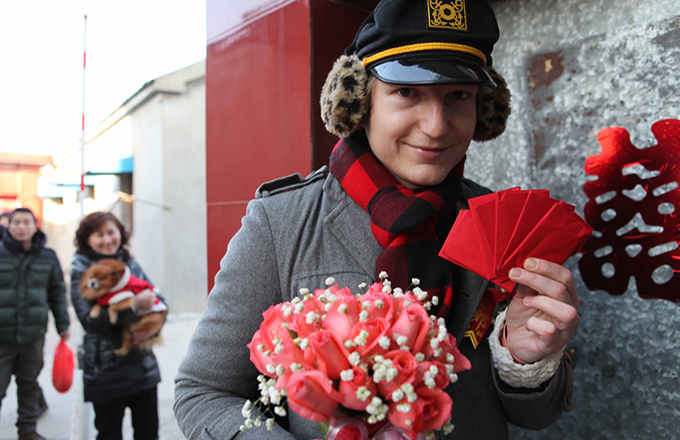Shanxi: the undiscovered gem of China
"Thank you for applying for the Shanxi tour, if you have time we would like to invite you to join us," said the email that arrived in my inbox. Attached to the email was an RSVP! My heart missed a beat! I had been selected to take part in a guided tour of this undiscovered gem in northern China! I wasted no time in replying - I was not going to miss this opportunity.
Shanxi, not to be confused with Shaanxi- a nearby province- is recognised as a birthplace of Chinese civilization, and a museum for ancient Chinese culture. Shanxi was also where the first merchants in Chinese history established currency exchanges, leading the way for the modern Chinese financial industry. With a wide range of landforms, Shanxi's climate is varied due to the various altitudes found here. Mountainous altitudes vary from 180-1500 meters; whilst the north peak of Mount Wutai rises to a dizzying height of 3058 meters!
A week before the trip I received the tour details together with an itinerary and flight information. No one could stop me now! I was joining the tour and I made detailed plans and arrangements for this trip. My bag was packed, and so was my camera, ready to capture every moment! As the day drew closer my excitement was soaring.
The flight from Beijing is a mere hour and 15 minutes to Taiyuan, Shanxi's capital. We swiftly cleared through arrivals and were met by our local representative who welcomed us and we were driven to our downtown hotel. The first item on our itinerary wasn't for a few hours, so I decided I wasn't going to waste anytime; armed with my camera, I headed out into the city.
Taiyuan, a very modern city offers the modern traveler everything they would expect to find. It also retains some of the old China that we are all looking for and that was what I was after. It didn't take me too long to find a hutong (alley way) where I would see/smell/taste traditional flavors! I entered and was not disappointed; street food was prepared everywhere I looked. The place was buzzing with locals going about their lives. The atmosphere was electric and my camera was capturing amazing shots! We returned to our hotel to prepare for dinner: a feast of flavors, colors and sounds, where we also watched how a small amount of dough turns into dancing mien ( the finest of noodles).
The next morning our tour towards the northern part of Shanxi province begun, heading towards Datong city which borders Inner Mongolia to the north, and where many historic sites such as the Yanmen Pass, Yungang Grottoes, Huayan, Shanhua and Hanging temples can be visited. Here you will also find the Guangling paper-cutting industrial park, part of China's intangible heritage where amazingly intriguing designs are handmade using paper.
The Yanmen Pass, an architectural wonder, stands proudly on top of Yanmen mountain. Known for its steep ascent, the imposing structure is an important part of the Great Wall. The well-preserved wall of the Pass which runs its way deep into the mountain valley and emerges again at the mountain top is actually the first pass of China. Here, we were also treated to a theatrical play at the open air stage and had the opportunity to mingle and take photos with the troupe.
The next stop of the day was Shuozhu city and the Yingxian wooden Pagoda. This incredible tower was built more than 900 years ago using only wood and assembled without the use of a single nail. It is the tallest and oldest pagoda in China and is one of three most famous towers in the world, together with the Eiffel Tower and the Leaning Tower of Pisa.
As the evening drew to a close, we headed to our hotel in Datong city where we enjoyed a buffet and had a chance to discuss our experiences as well as look through some of the photos that we took, both as a group as well as individually. Despite this being a long day, we were all elated and couldn't stop talking about the day's tourist spots.
On day three of our tour we visited the famous Yungang Grottoes- a religious site listed as a UNESCO world Heritage site. Here, one can admire the multitude of Buddha statues carved into the rock, as well as taking a few moments to walk around the well manicured gardens surrounding the ancient site.
Day four of our trip was the highlight of the tour; we were visiting the the Hanging Temple of Hunyuan and I couldn't wait to get there! As we approached, the scenery was breathtaking and the temperature had dropped by a few degrees. On the grounds of the Hanging Temple are green fragrant flowers planted in such way that they read; "天下巨观". The meaning which loosely translates to a " Great view of the World".
I concur that one could not be more correct because indeed the temple is an amazing sight. The religious structure is situated at the base of Mount Heng and suspended 75 metres above ground. When I climbed up towards the temple I felt as if I was going to meet the gods. Walking along the narrow platforms and stairwells one can't but admire the surrounding scenery and marvel at the ingenious architecture.
After lunch, a fabulous culinary experience at a local restaurant, we headed to the Guangling Paper-cutting Industrial Park. Here, we had the opportunity to see how amazingly intriguing designs are cut out and hand painted by local craftsmen. Paper cutting is a painstaking art, now listed as part of China's intangible cultural heritage. This visit was so interesting, that none of us wanted to leave; we were drawn to the intricacy and precision of this work and had so many questions to ask that delayed our planned departure.
Shanxi has amazed every member of our tour group and we all returned home with warm thoughts and delighted at our experience. Shanxi, a not so well-known province, off the beaten tourist track, is definitely a top destination for those who are seeking a trip into China's history and culture; one not to be missed!


















